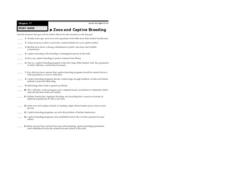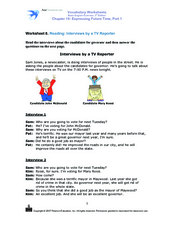Curated OER
Cellular Transport and the Cell Cycle
With a multitude of questions, this activity offers students the opportunity to review their knowledge about the cell cycle. Question types include true/false, word bank, and completing a table about the differences between interphase...
Curated OER
Egyptians and the PKU Food Pyramid
For this Food Pyramid worksheet, 3rd graders study the make up and components of the food pyramid and the pyramids of the ancient Egyptians. Students answer 10 true/false questions and complete a graphic organizer at the...
Curated OER
Zoos and Captive Breeding
After reading pages 470-472 of an unspecified textbook, students compare statements about zoos and captive breeding to information presented in text for statements of truth. Students change statements that are false so that the...
Curated OER
Balance Benders - Algebraic Reasoning
In this algebraic reasoning worksheet, students solve 4 multiple choice and true/false problems. Kids determine which statements about equality are true. Students find the appropriate representation of a given symbol in terms of another...
Curated OER
Viruses and Bacteria
Reviewing the key terms and ideas from a chapter about viruses and bacteria, this activity helps students to reinforce their knowledge about the makeup and life cycle of a virus. Students answer true/false questions, blanks from a word...
Curated OER
Health: The Three Dimensions
Students examine the three dimensions of health, wealth, and happiness from both emotional and social perspectives. Among the week-long activities are discussions about good and poor habits, minimizing risks by proper planning and...
Curated OER
The Moon is made of Cheese
Eighth graders explore the reasons why they believe scientific ideas are true. They think critically rather than accept everything they are told without question.
Curated OER
Interview by a TV Reporter: Future Time Activity
In this future time worksheet, students read interview about candidates for governor, then answer a set of 10 true/false questions about the interviews.
Curated OER
De Vacaciones en Bariloche
Students answer simple questions that do not require much analysis. They answer true/false questions. Students answer multiple choice which would be the best meaning of this word. They use graphic organizers to contrast a cheap vs, a...
Curated OER
You and Yours
In these grammar activity worksheets, students answer the questions about the statements that use the word you and the word yours. Students complete 3 activities.
Curated OER
ESL Advanced Reading Comprehension
In this advanced ESL reading comprehension worksheet, students read a detailed article about a couple who sues a TV company. Students then answer 7 true/false questions. This is most appropriate for adult ESL students.
Illustrative Mathematics
Above and below sea level
Using the real-world example of elevation, above or below sea level, young mathematicians interpret expressions using negative signs, and absolute value. This task provides a good opportunity to discuss the notion of magnitude and...
Los Angeles County Office of Education
Assessment for the California Mathematics Standards Grade 1
Here is an assessment designed to test mathematicians' knowledge of writing numbers, comparing numbers, skip counting, solving addition and subtraction problems; along with measuring objects, telling time, identifying shapes, reading...
Inside Mathematics
Quadratic (2006)
Most problems can be solved using more than one method. A worksheet includes just nine questions but many more ways to solve each. Scholars must graph, solve, and justify quadratic problems.
CCSS Math Activities
Smarter Balanced Sample Items: 7th Grade Math – Claim 2
To solve or not to solve that is the problem. A slide presentation of 17 items show different ways that Smarter Balanced assesses Claim 2, problem solving. The items span from sixth and seventh grade concepts to highlight the...
EngageNY
From Equations to Inequalities
Sometimes, equality just doesn't happen. Scholars apply their knowledge of solving equations to identify values that satisfy inequalities in the 34th installment of a 36-part module. They test given sets of numbers to find those that are...
Novelinks
Tuesdays with Morrie: Anticipation Guide
To generate interest in Tuesdays with Morrie, class members respond to an anticipation guide that highlights many of the major issues address by Mitch Albom's story.
EngageNY
From Ratio Tables to Equations Using the Value of a Ratio
Use the value of a ratio to set up equations. The teacher leads a discussion on determining equations from ratio tables in the 13th portion of a 29-part series. Pupils determine which of two equations to use to find the solution....
EngageNY
Proving Trigonometric Identities
Young mathematicians first learn the basics of proving trigonometric identities. They then practice this skill on several examples.
EngageNY
Solution Sets of Two or More Equations (or Inequalities) Joined by “And” or “Or”
English and math have more in common than you think. Make a connection between a compound sentence and a compound inequality with an activity that teaches learners the difference between an "and" and "or" inequality through solutions...
It's About Time
Accidents
Did you know that cars weren't designed for passenger safety until the 1960s? The lesson starts with a quick quiz on automobile safety. Then, scholars evaluate three cars for their safety features. This is the third in a set of nine...
Balanced Assessment
Legos
How many ways can you arrange two six-hole Legos? Scholars practice their understanding of combinations as they investigate this question. As they create a plan, they develop a specific definition of a combination.
HeyMath!
Volume of Pyramid
Go beyond the basic formulas and uncover the surface area and volume of 3-D shapes with this comprehensive and organized worksheet packet. The problems include the basic formula computations while also challenging your learners to derive...
Charleston School District
Solving Equations with Infinite or No Solutions
Where did all the variables go? Scholars learn how to interpret an equation when they eliminate all variables during the solving process. They interpret the solution as infinite solutions or no solutions.

























